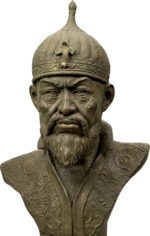How to Pronounce Timur
#50
Most Popular
Boost
Apr 09, 1336 Shahrisabz, Uzbek Soviet Socialist Republic, Uzbekistan Died on 19 Feb 1405 (aged 68)
Turco-Mongol ruler
AriesTimur, Date of Birth, Place of Birth, Family, Facts, Age, Net Worth, Biography and More in FamedBorn.com

Turco-Mongol ruler
Aries